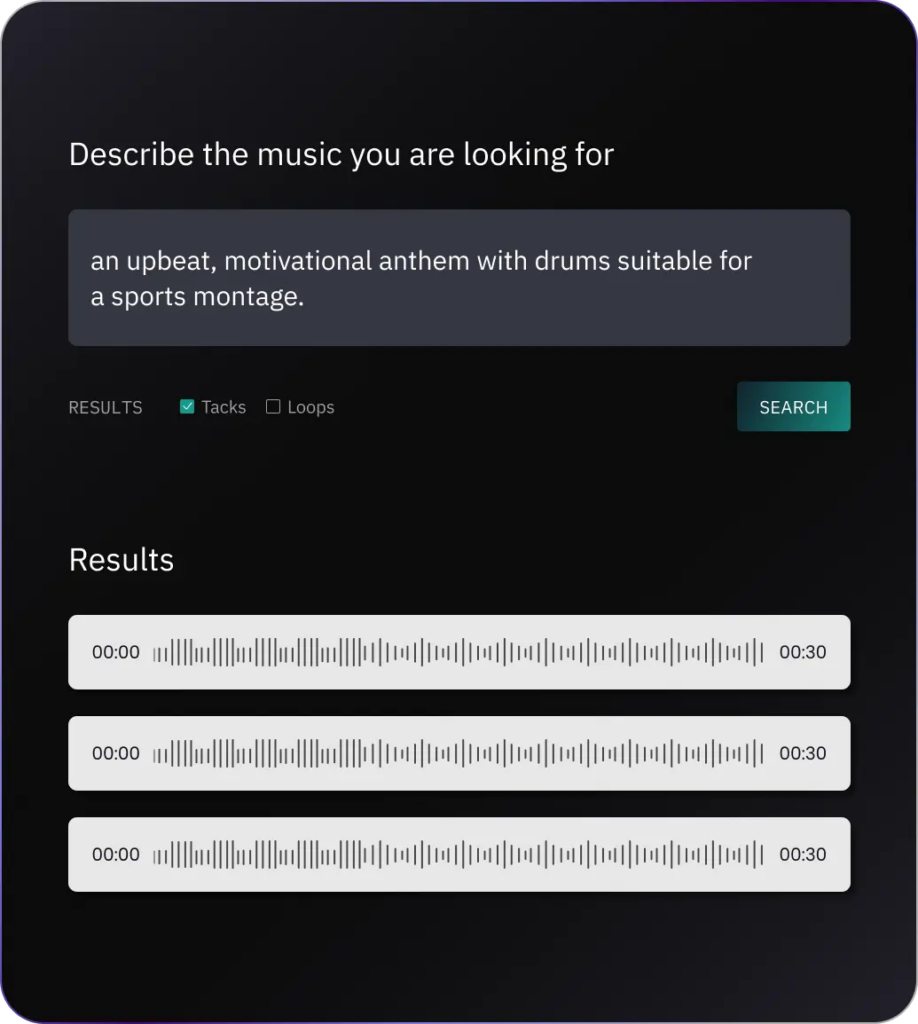Picture this: You’re a musician with hours of recordings, or maybe you run a music library trying to help creators find the perfect track for their next video. You know the music is there, but finding it feels like searching for a tiny puzzle piece in a massive jigsaw.
Cyanite.ai brought AI technology to help analyze music and make searching easier. While it offers helpful features, some users wish it was simpler and worked better with different types of audio files.
If you feel the same way, we have good news for you. You have recommendations of alternatives to Cyanite.ai that might work better for your needs.
This article explores three leading Cyanite.ai alternatives that offer simpler, more flexible ways to search and organize music while keeping both creators and musicians in mind.
Let’s find out more about them!
Why Opt for a Cyanite.ai Alternative?
While Cyanite.ai offers valuable music analysis and cataloging features, these limitations highlight the need for alternatives to better suit specific workflows.
Musicians and creators, especially those working with diverse audio qualities or experimental genres, will benefit from exploring platforms that offer more flexible and intuitive user experiences.
First, let’s discuss why users are looking for an alternative to Cyanite.ai anyway.
Cyanite.ai’s search capabilities are way too dependent on audio quality
The effectiveness of Cyanite’s AI tagging heavily depends on the quality of uploaded audio files. This can be challenging for independent musicians working with demos or recordings from various sources. When your audio quality doesn’t meet the system’s requirements, you might receive inaccurate tags and descriptions, affecting your music’s potential to get discovered.
(Source)
Complex learning curve for new users
Users have reported a significant learning curve when starting with Cyanite, particularly with audio analysis and tagging. For busy musicians and creators who need to catalog their work quickly, spending extra time learning complex workflows impacts their productivity and delays project timelines.
(Source)
Often fails to capture musical nuances
Cyanite’s AI technology has limitations in accurately capturing a track’s subtle nuances and complexities. This concerns artists or those creating experimental music, as the system might incorrectly categorize or oversimplify their work.
(Source)
Manual oversight is still required
Despite its automation features, Cyanite users report that the platform still requires human supervision to ensure accurate tagging and categorization. For creators managing large catalogs, this means they can’t fully rely on the automated system and need to allocate time for manual verification, potentially defeating the purpose of an AI-powered solution.
(Source)
If you can relate to any one or more of these challenges, it is always a good idea to look for an alternative to Cyanite.ai.
3 Best Cyanite.ai Alternatives for Musicians and Creators
Finding the right music doesn’t have to be complex.
These Cyanite.ai alternatives offer intuitive search capabilities while respecting creator rights, making them excellent choices for both musicians and content creators looking for better ways to organize and discover music.
Here’s a quick sneak peek into the Cyanite.ai alternatives before we discuss each tool in detail:

Let’s dive deeper into each tool:
Beatoven.ai: Music platforms, libraries, and content creators who need to implement advanced search functionality in their existing systems while maintaining ethical AI standards

Beatoven.ai stands out by offering both ethical AI practices and a powerful AI music search API that lets users talk naturally to their music libraries. Recently certified by FairlyTrained for using only licensed data, they’ve built a search system that goes beyond basic tag matching.
Their Search API enables free-text exploration of music catalogs, understanding contextual queries like “uplifting background music for a winter scene” or “energetic beats for a product launch.”
What’s particularly useful is how the API moves away from traditional tag-based searching, letting users express their needs in plain language while continuously improving its understanding over time. For music libraries and platforms, this means they can integrate Beatoven.ai’s search capabilities into their own systems, offering their users a more intuitive way to find the right tracks without worrying about incorrect tags or limited metadata.
Standout features:
Harmix: Video producers and content creators who need music that matches specific visual content

Harmix flips the script on traditional music search by starting with your visuals. Instead of typing out descriptions or scrolling through endless genre tags, you can simply upload your video clip or image, and their AI analyzes the visual content to find matching music.
It’s particularly clever at picking up on mood transitions within videos – like going from tense to triumphant – and finding music that follows the same emotional arc. Their segment-based search is a game-changer for editors needing music-matching scenes or transitions. You can even mark specific moments in your video where the mood shifts and Harmix will find music with matching energy changes.
Standout features:
AIMS: Music supervisors and content creators who prefer natural language search

AIMS takes the complexity out of music search by letting you describe what you need in plain English. No more getting stuck with rigid category filters or industry jargon – you can write something like “music for a scene where someone’s walking through New York at 3 AM” and get surprisingly accurate results.
Their system understands context well, picking up on subtle differences between similar requests (like “peaceful morning coffee” versus “late-night cafe vibes”). What makes AIMS particularly useful is how it learns from the way you phrase things – if you tend to describe music in terms of emotions, it adapts to that communication style, making each search more accurate than the last.
Standout features:
Conclusion
Finding the right tool to search and organize music shouldn’t feel like solving a puzzle. While Cyanite.ai pioneered AI-powered music analysis, our exploration of alternatives shows some options might better suit your creative workflow.
Each platform we reviewed brings something unique, from Harmix’s visual approach to AIMS’s natural language understanding. However, Beatoven.ai stands out by combining ethical AI practices with an intuitive search system that grows smarter over time. Plus, its musician-first approach means you’re not just finding music more easily, you’re supporting fair practices in the AI music industry.
Try using Beatoven.ai for free to see if it matches your needs.

Sreyashi Chatterjee is a SaaS content marketing consultant. When she is not writing or thinking about writing, she is watching Netflix or reading a thriller novel while sipping coffee.

